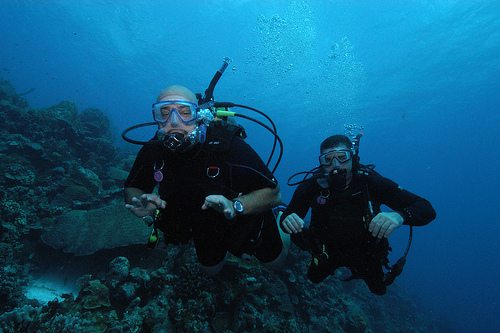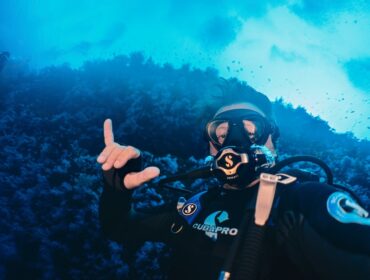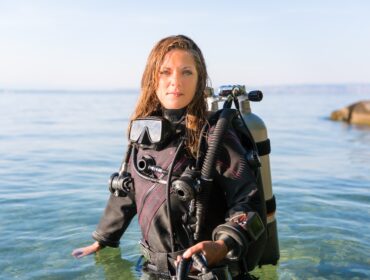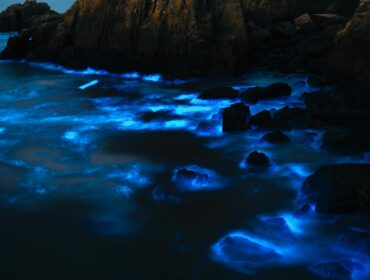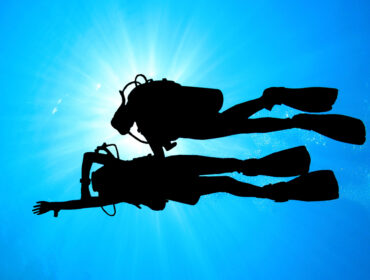Here are 10 qualities to look for in a good dive buddy to make your dives stress-free and more than just pleasant:
Communication
One of the most essential qualities of a good buddy is communicating clearly and instantly underwater. These are not just hand signs but the whole process, i.e., the message passed, received, returned, and understood without a signal. If you have to break the flow of your dive to get your message across to your buddy, then communication between you isn’t excellent. Good communication encompasses everything from understanding each other’s hand signals to facial expressions, gestures, and feelings through eye contact. Imagine, in an emergency, trying to signal your buddy to share air while he/she is busy wondering what type of fish you are trying to signal. A good buddy will probably look at you and signal your gas consumption without even having to signal for “How much air you have left?”
Trust
Trusting your Dive Buddy is paramount in scuba diving, especially when entrusting your life and safety to him/her underwater. Knowing your dive buddy beforehand is essential to build up this trust. Trust often comes quickly and automatically if your dive buddy is a close friend, acquaintance, relative, or spouse, making them 50% there to become a good dive buddy. Often, when your Dive Master or Dive Instructor assigns you, somebody you don’t know as your buddy, the issue of trust creeps in, and getting to know your dive buddy before the dive will go a long way toward you being comfortable diving with him/her underwater rather than stressed.
Matching Skills
Always dive with a buddy that closely matches your diving skills underwater and shares your depth limits. This way, you won’t be forced out of your comfort zone or force your buddy out of his/hers. Skills don’t just relate to certification level, i.e., Open Water, Advanced Open Water, Dive Master, etc. Also, ensure your buddy has a similar or comparable experience to yours so that if a situation arises, you can assist the other, rather than one being dependent on the other.
Complementary Interests
Having the same dive goals and sharing similar interests goes a long way toward a good buddy. Just imagine the times your buddy has been busy skimming the sea bed examining macro creatures while you’ve been disinterested, hovering above looking for sharks and other pelagic fish. It is a similar case when your companion is an underwater photographer, causing you to frequently have to stop and wait to break the flow of your dive. At the end of the dive, when you both excitedly chatter about the things you saw underwater, you know you share the same interests.
Pace
We’ve all faced this at some point or the other where your dive buddy swims much faster than you, resulting in you having to stare at his 6 O’clock the entire dive, or vice versa, where your quicker pace makes you have to constantly hold back and wait for your buddy to catch up. This causes unnecessary stress and/or resentment, taking away from the fun of the dive, so you must have a buddy with a pace similar to yours underwater.
Positioning
Though connected to pace but not necessarily, the formation or positioning of your buddy through the dive dictates the qualities of a good dive buddy. A good buddy will stick to you like glue without getting in your way or constantly bumping into each other. You know you have a good buddy when you do not have to use more than a 1/4 turn of your head to either side to know where your buddy is at any time during the dive. Having to look up, down, or even stop to turn around constantly means your positioning is wrong.
Good Judgment
Having similar skills does not necessarily mean your buddy will have the good judgment to act on those skills when required. A good buddy knows when it’s time to call it a day, makes good decisions based on the situation, knows limits and depths, and avoids unnecessary decompression dives. Good judgment includes calling you out on your mistakes underwater and keeping you in check and within the boundaries of safe diving.
Good Situational Awareness
A good buddy should have constant situational awareness, paying attention to gas consumption, depth, navigation, pace, currents, gas consumption position, signals, discomfort with equalization, etc. We’ve all dived with the buddy that stares straight down or ahead like a donkey with blinders on. You have to wave about to get his/her attention, and more often than not, they haven’t a clue where they are.
Similar Air Consumption
Pairing up with a dive buddy who runs out of air while you still have half your tank left is annoying, and most of us have experienced this at some point. A good companion should have similar gas consumption rates as yourself, allowing you both to have identical dive times and enjoy it without worrying about when your buddy will run out of air. Similar air consumption gives you the peace of mind and ability to ascertain from your depth gauge what your buddy’s air would be like through the dive and plan navigation accordingly.
It will not push you out of your diving comfort zone and skill level
A dive buddy that will dive to depths beyond your prescribed comfort zone and skill levels, attempt maneuvers, dive in strong currents, unsafe conditions, poor visibility conditions, push decompression limit times, or descend and ascend at speeds you are uncomfortable with is not a good buddy. Even if your buddy can do it, putting you outside your comfort zone is inconsiderate and possibly risky.

